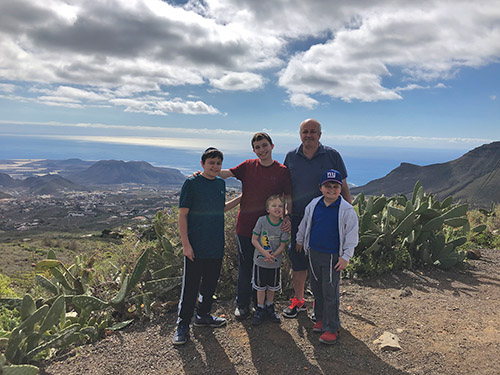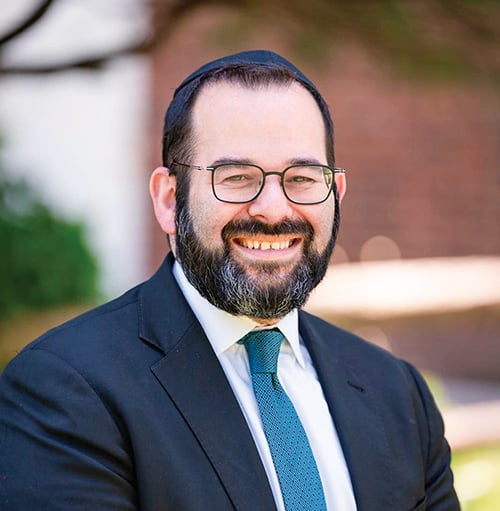



This year for yeshiva week, my family and I spent 10 days in the Canary Islands, a dream of mine since my husband and I traveled to Gibraltar on our first trip as a married couple. Towards the end of our trip, we toured the capital city of Santa Cruz in Tenerife. My sons were frolicking in a public square in front of the opera house. An elegantly dressed middle-aged couple was walking down the stairs and, seeing our boys, went out of their way to approach me. Smiling widely, and with their broken English, they told me how happy it made them to see young boys wearing kippot in their city. They used the Hebrew word, and though they otherwise looked exactly like any other native couple in the city, I knew they were Jewish. I also knew the importance of this conversation, because Jewish life in Tenerife is rapidly and permanently fading out, and there is no longer an active synagogue on the island, despite the continued presence of a handful of identifying Jews. While the situation is inherently a sad one, my heart swelled because I knew that what I have always tried to teach my children is, in fact, working.
As an anthropologist at heart, I love to travel the world widely with my family. I want them to hear the singing and see the costumes of other cultures. I want them to have easy, open conversations with people who do not look or live like them, to learn to understand and empathize with people whose life experiences do not match their own. I want them to appreciate the music of a foreign language, looking for parallels and similarities to their own, rather than always demanding familiarity. I would like them to ask why, fully open to and curious for the honest reply, rather than resenting having to ask in the first place. While they cannot taste all the flavors because of our dietary restrictions, I still inspire them to keep their eyes and hearts open to all the colors and sounds in the world, because if they truly believe in God, they know that this big wide world and the people in it are all part of His glory.
Still, as much as I love exposing them to foreign landscapes and cultures, my children need to be alert and informed. They need to know that, while our Jewish heritage is rich and thriving, and our contributions to the modern world are boundless in the benefits they provide, we are still but a tiny minority, and the number of those who hate us probably far outweighs those who admire and love us. I teach my children to wear their Judaism on their sleeves, as well as on their heads and torsos. I want them to walk proudly through all the places in the world where the Jews once were or never were or never will be, and hold their heads up high. Their postures and expressions should read, “We are here right now, on our own terms, and we are proud.” Our legacy is one of persistence, resilience, and miraculous survival in the face of adversity and persecution.
The history of the Jews in Tenerife is a classic parable – they kicked us out from one place, so we moved to another, waiting for time or the next conqueror to again dilute our presence. In this case, Jews were a presence on the Canary Islands of Tenerife and Gran Canaria beginning soon after their expulsion from mainland Spain in 1492 (which displaced my own paternal family to Saloniki, Greece). Of these, only the outwardly converted Catholic “conversos” were allowed to live freely in this Spanish-owned territory, though some continued to practice Judaism in secret. But the Jewish community in Tenerife has gradually faded out, predominantly through assimilation (with a small but heartening percentage emigrating to Israel), and even though the physical building of the single synagogue remains standing, the community transferred their only Torah to Las Palmas on Gran Canaria in the mid-1980s. This is a very decisive move, essentially indicating that a community no longer requires a physical connection to the most sacred and essential of our religious scriptures. It symbolizes a group of people who share a past but are losing the communal language to ensure their future.
The day of our return from Tenerife, Jan. 27, coincided with International Holocaust Remembrance Day, which is marked by the liberation anniversary of the most notorious of death camps, Auschwitz-Birkenau. So many people, Jew and non-Jew alike, are by now familiar with the abominable photos of emaciated concentration camp residents, public executions, piles of discarded clothing and heaps of bodies in shallow graves which document the diabolical evil turned systemically into practice by the Nazis. Let us not forget the infamous crematoria – stop for a moment and consider the concept of an oven created for the express purpose of incinerating human beings.
The children and grandchildren of Holocaust survivors, such as myself and many of my friends, are familiar with these photos since our early elementary school days. We are no longer shocked, though we are appalled anew with each viewing. But we must continue to circulate and publicize these images, as a symbol of what we have overcome and will never become again. History is being selectively “revised” all the time, and it is increasingly important to tell this particular story, as the number of its remaining first hand witnesses sadly diminishes. These images should not define us, but they can be used to unite us.
I must stress, however, that we cannot dedicate all of our efforts against anti-Semitism to examples from the past. Hatred of the Jews is not only ancient history – it’s a continued story on a streaming loop. We need to be aware of the very real and very tangible manifestations of anti-Semitism in our midst right now. It is propagated in the form of words – either whispered, trumpeted thunderously, or printed – just as effectively as actions.
Proponents of the horrific BDS movement continue to hoist their slanderous placards in once-peaceful places such as college campuses, where Jews continue to be among their brightest students. Ignorant yet menacingly loud individuals across the map continue to spew lies against Israel and her democratic policies, inciting the even more ignorant to take up causes which are entirely fabricated. Words such as “apartheid” and “occupation” have absolutely no place in the same sentence as “Israeli,” yet are routinely placed side by side in the media. Palestinian children are weaned on the milk of hatred and brainwashed to put their hatred of the Jews above a respect for their own lives. Politicians in our own democratic U.S. holding proven anti-Semitic ideology such as support of BDS and “anti-Zionism” become increasingly more powerful each day. It is a danger to us as a people to downplay the presence of the ignorant and hateful among us, especially those who are armed with actual weapons in place of actual knowledge. Our rights to safety and survival equal those of everyone else – but it is our own job to ensure these.
We must teach our children to be proud of who they are, where they come from, and where they are going, because our culture and ethics merit this respect. Let us encourage our children to walk proudly and freely wherever they wish, while never losing track of their origins. Let us foster their world view to be wide and far-reaching, while reinforcing the value of our traditions. Let us teach our children to be models of empathy, compassion and respect wherever they are and in whatever they are doing, hoping against all odds that the world will judge them based on their own behavior rather than the fickle and erroneous criteria of public opinion.
I hold my hand to my heart in honor of each and every victim and survivor of the Holocaust, as well as every “righteous gentile “ who aided them in even the smallest of ways at their own peril. In their memory, I shout “Never Again!” with all my heart, and with my eyes wide open.
By Talya Toledano Davidovich
Talya Toledano Davidovich works as a radiologist in a hospital in the Bronx. She and her husband, Shmulik, have four boys and live in Teaneck, when not seeking adventures around the world. She dedicates this article to her maternal grandparents, Izzy and Julia Karten (Yisrael ben Moshe and Yola bat Moshe) z”l, who saved hundreds of Jewish lives as leaders of a partisan band in the Ukrainian forest during WWII. May their memories continue to be a blessing.













